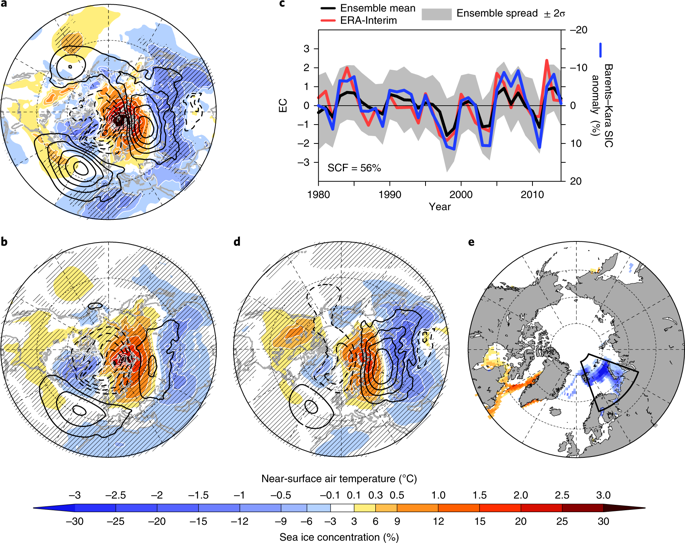Nature Climate Change ( IF 29.6 ) Pub Date : 2019-01-14 , DOI: 10.1038/s41558-018-0379-3 Masato Mori , Yu Kosaka , Masahiro Watanabe , Hisashi Nakamura , Masahide Kimoto

|
Northern midlatitudes, over central Eurasia in particular, have experienced frequent severe winters in recent decades1,2,3. A remote influence of Arctic sea-ice loss has been suggested4,5,6,7,8,9,10,11,12,13,14; however, the importance of this connection remains controversial because of discrepancies among modelling and between modelling and observational studies15,16,17. Here, using a hybrid analysis of observations and multi-model large ensembles from seven atmospheric general circulation models, we examine the cause of these differences. While all models capture the observed structure of the forced surface temperature response to sea-ice loss in the Barents–Kara Seas—including Eurasian cooling—we show that its magnitude is systematically underestimated. Owing to the varying degrees of this underestimation of sea-ice-forced signal, the signal-to-noise ratio differs markedly. Correcting this underestimation reconciles the discrepancy between models and observations, leading to the conclusion that ~44% of the central Eurasian cooling trend for 1995–2014 is attributable to sea-ice loss in the Barents–Kara Seas. Our results strongly suggest that anthropogenic forcing has significantly amplified the probability of severe winter occurrence in central Eurasia via enhanced melting of the Barents–Kara sea ice. The difference in underestimation of signal-to-noise ratio between models therefore calls for careful experimental design and interpretation for regional climate change attribution.
中文翻译:

北极海冰损失对最近欧亚降温影响的协调估计
北部中纬度地区,尤其是欧亚大陆中部地区,近几十年来经历了频繁的严冬1,2,3。北极海冰损失的远程影响已被建议4,5,6,7,8,9,10,11,12,13,14 ; 然而,由于建模之间以及建模与观察研究之间的差异,这种联系的重要性仍然存在争议15,16,17。在这里,使用对观测结果的混合分析和来自七个大气总循环模型的多模型大型合奏,我们研究了造成这些差异的原因。虽然所有模型都记录了巴伦支–卡拉海海域强迫表面温度对海冰损失的响应结构(包括欧亚降温),但我们发现其大小被系统地低估了。由于低估了海冰强迫信号的程度,因此信噪比明显不同。纠正这种低估现象可以使模型与观测值之间的差异得到协调,从而得出以下结论:1995-2014年欧亚中央降温趋势中约有44%归因于巴伦支–卡拉海的海冰损失。我们的结果有力地表明,通过增强Barents–Kara海冰的融化,人为强迫已大大扩大了欧亚大陆中部严重冬季发生的可能性。因此,模型之间信噪比低估的差异要求对区域气候变化归因进行仔细的实验设计和解释。











































 京公网安备 11010802027423号
京公网安备 11010802027423号